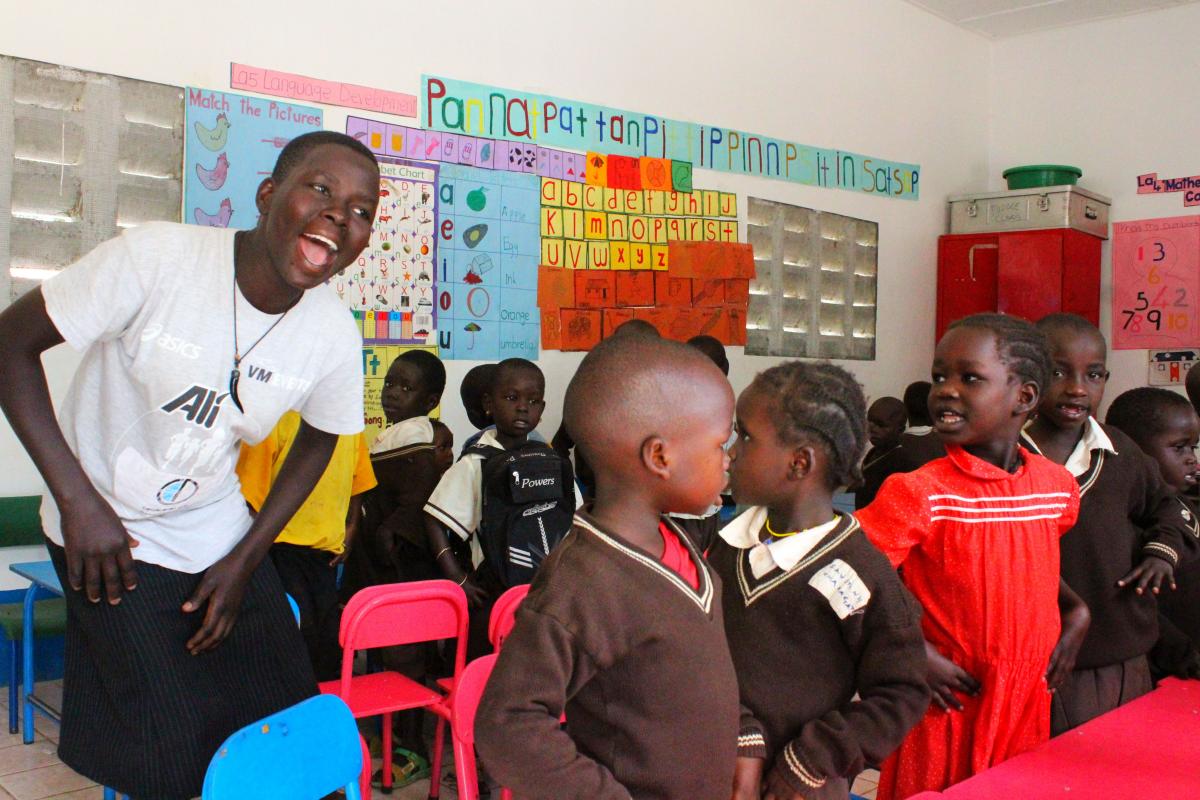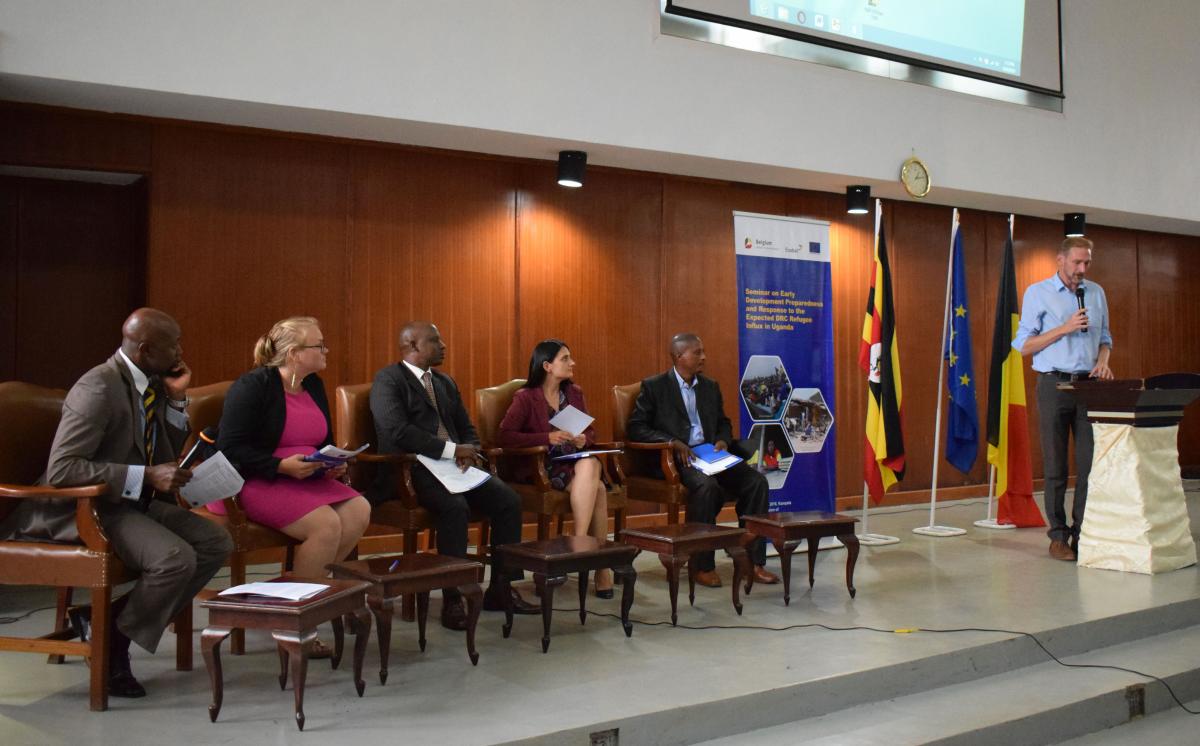Opzoeken
1920 - 1935 van 2520 nieuws bekijken
-
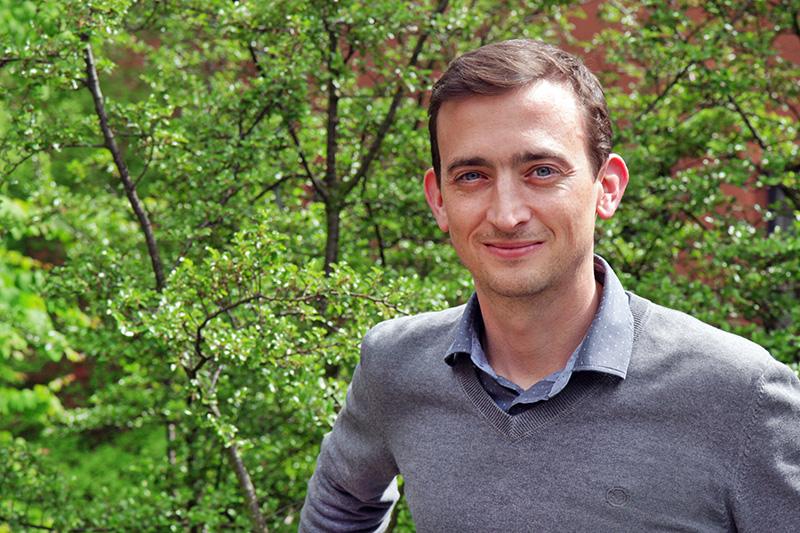
5 questions à Arnaud Leclercq Responsable du programme Wehubit
Reece-hermine ADANWENON | 26/07/2018
Enabel finance déjà une série d’initiatives de digitalisation dans les pays partenaires. En quoi le projet Wehubit est-il différent? Notre programme ne s’inscrit pas dans une dynamique de coopération bilatérale. Il ne s’agit pas pour nous d’aller mener une mission de A à Z en collaboration avec les autorités d’un pays partenaire. Le rôle de notre plateforme est de financer des initiatives numériques, menées par le secteur privé, par des associations sans but lucratif ou le secteur public. Les prêts au secteur privé seront octroyés par notre partenaire BIO, alors que les subsides pour des organisations sans but lucratif seront octroyés par Enabel. Les porteurs de projet doivent se faire connaître en s’inscrivant sur notre portail www.wehubit.be. Autrement dit, nous n’allons pas nous-mêmes à la recherche de projets, et nous ne nous impliquons pas directement dans leur mise en œuvre. Nous sélectionnons les candidats qui nous semblent les plus prometteurs, qui s’inscrivent dans la lignée de nos principes directeurs et nous leur apportons des fonds qui les aideront à concrétiser leur initiative. Attention, il ne s’agit pas non plus de financer des startups: comme nous ne disposons pas des capacités nécessaires pour accompagner sur le terrain les idées que nous finançons, nous sélectionnons des initiatives qui ont déjà fait leurs preuves, et qui ont besoin de fonds pour passer à l’étape suivante. Pour parler le langage du monde des startups: nous finançons du scaling-up. Quels sont vos critères de sélection? Et bien, au-delà des critères d’éligibilité, nous avons mis en place une série de principes directeurs. Pour commencer, nous voulons financer des projets qui utilisent le numérique comme outil pour contribuer au développement du pays en apportant quelque chose à la population. Pour vous donner un exemple parlant, supposez un pays où il existe des régions rurales isolées, où l’accès à la médecine est difficile pour de simples raisons logistiques. S’il faut deux heures à un malade pour arriver chez le médecin le plus proche, un système qui permet des consultations à distance à l’aide de tablettes numériques peut réellement aider les autorités à assurer des soins de première ligne. Voilà pour nous un exemple intéressant.Ensuite, nous nous basons aussi sur la note stratégique préparée par la coopération belge en 2016. Elle énonce deux principes directeurs et trois axes stratégiques: les principes directeurs sont "do no harm", donc tenir compte des effets collatéraux négatifs éventuels, et "put people first", faire passer les gens d’abord. Quant aux angles stratégiques, il s’agit d’une meilleure utilisation du big data, de la promotion d’une société plus inclusive, et de la stimulation d’une croissance inclusive et durable. Troisièmement, nous privilégions les approches qui promeuvent le respect des droits de l’homme et qui renforcent l’État de droit. D’ailleurs, nous voulons que les initiatives sélectionnées concernent un des 14 pays partenaires d’Enabel. Enfin, nous analysons si les projets adhèrent aux principes du développement numérique, qui sont des principes établis au niveau international par toute une série d’acteurs actifs dans le développement. « Nous sélectionnons des initiatives qui ont déjà fait leurs preuves, et qui ont besoin de fonds pour passer à l’étape suivante. Pour parler le langage du monde des startups: nous finançons du scaling-up! »
-
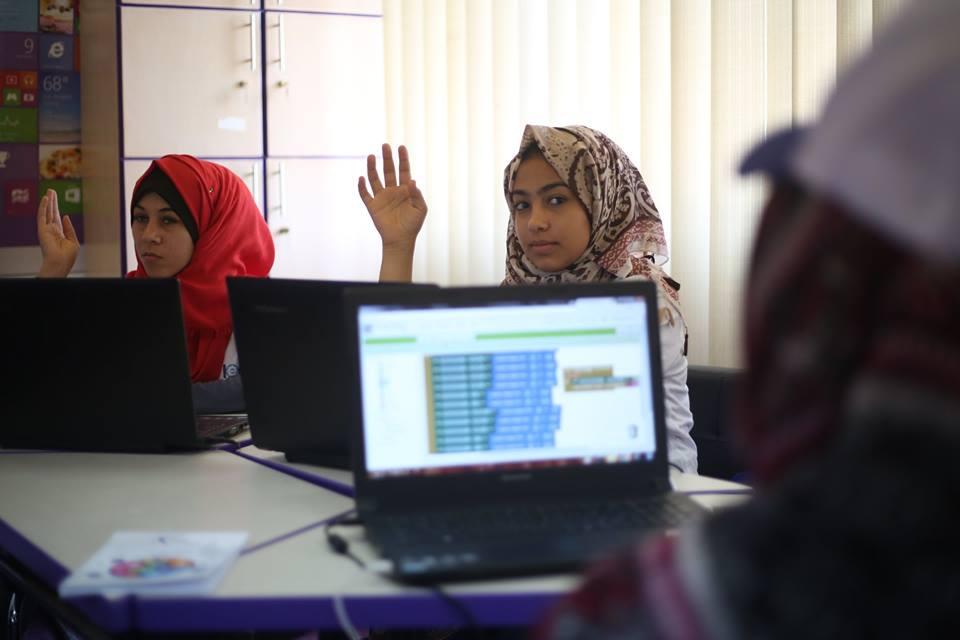
Summer camps are promoting technical and vocation training in Gaza
Laura SCHILLEMANS | 24/07/2018
The LET council launched a series of TVET summer camps, with the support of TVET donors IRPAL, GIZ and Enabel. More than 500 ninth and tenth graders from all over the Gaza Strip have participated in 7 camps which taught them more about technical and vocational training. The camps provided the students with basic skills in professional disciplines like carpentry, electricity, web application building, industrial electronics, sewing, photography, and beautification. There was also a sports program for development, aimed at providing the participants with life skills such as perseverance, stress control and working together in a team. A large number of students decided to enroll in vocational and technical schools for one of the professions they practiced. For more information on the summer camps: https://www.facebook.com/LetCouncil/
-
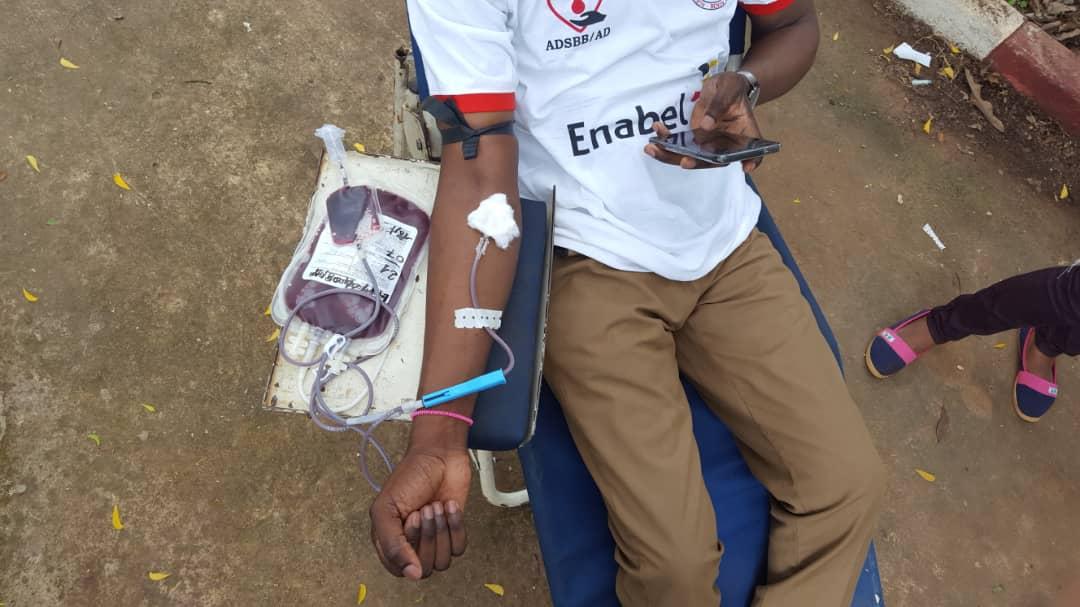
Journée de fidélisation des donneurs de sang à Natitingou: Des centaines de poches de sang collectées pour sauver des vies
Reece-hermine ADANWENON | 23/07/2018
Le Samedi 21 juillet 2018, n’est pas un jour ordinaire comme tous les autres jours. Parés des tee-shirt à l’effigie d’Enabel (Agence belge de développement), de l’ANTS (Agence Nationale pour la Transfusion Sanguine) et de l’ADSB-AD (Association des Donneurs de Sang Bénévoles du Bénin-Atacora-Donga), les fidèles donneurs de sang de l’Atacora-Donga ont commémoré l’édition 2018 de la Journée de fidélisation des donneurs de sang dans la sensibilisation et la collecte de sang. A travers une caravane de solidarité des citoyens donneurs de sang, des animations culturelles et des jeux et concours, toute la population de Natitingou a été sensibilisée et mobilisée sur l’importance du geste salvateur : DONNER SON SANG. De nouveaux donneurs se sont engagés en donnant leur sang. Pour rappel, l’Atacora et la Donga sont des départements du Bénin où la pénurie de poche de sang dans certaines banques de sang est récurrente. Il a été estimé que pour pouvoir répondre au besoin de la population, 2500 poches devaient être prélevées courant le mois de juillet. Aujourd'hui, c’est avec peine que 500 poches de sang sur les 2500 sont collectées. Cette situation est alarmante pour le bien-être et la santé de la communauté. Les plus vulnérables sont les enfants.
-
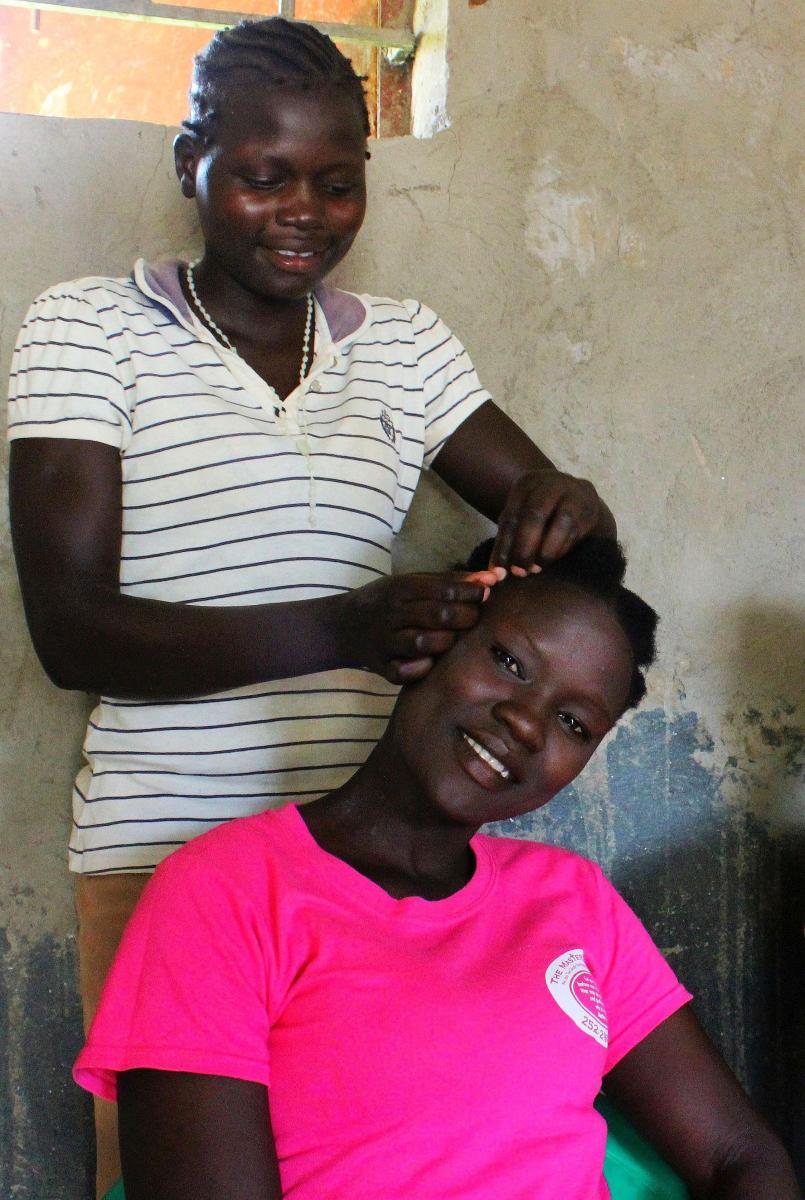
Skills Development Fund restores hope through hairdos
Hanna DEKERK | 18/07/2018
“I like hairdressing because it makes women look beautiful” says 25-year old Immaculatie Akot, while she braids her classmate's hair. She is one of the 25 hairdressing trainees at the Aridland Development Programme (ADP) in Abim district.Life has not been easy on Immaculatie ever since the father of her twin boys died last year. “I had nothing to do at home and life was difficult. My parents advised me to do this training instead of crying every day. They take care of my boys while I am here in boarding school.” After the 6-month training Immaculatie wants to open her own hairdressing saloon in Karenga, a sub county of Kaabong district where she lives. “In Karenga there is only one hairdresser, so I think there is a chance to start. This training has given me hope. ” The hairdressing trainings are organized by Enabel’s Support to Skilling Uganda project, as part of the Skills Development Fund. The aim is to equip young Karamojong with employable skills to increase their livelihood opportunities. ADP program Manager, Christopher Komakich confirms that “The Skills Development Fund is helping us grow by allowing us to increase our capacity for high-quality training. We also developed a strategy to reach out to the local population. ” After the training, students can request additional support from ADP to start their businesses. However, they need to prove the viability of their work plans within the domain that was taught to them. When they then have a funding gap, ADP can provide start-up support and regular follow-ups. The Support to Skilling Uganda project in Karamoja is implemented with financial support from Irish Aid.
-
THESE GRADUATES ARE GUARANTEED TO FIND JOBS
Hanna DEKERK | 18/07/2018
“I feel like I am learning so much every day.”, says 22 –year old Helen Okudet. She is a trainee at the Early Childhood Development (ECD) teacher programme of Cooperation and Development (C&D) in Moroto. ECD comprises of 3 levels: baby class, middle class and top class, after which children can start primary school. After completing the 6-month training, all 34 trainees need to succeed the exam of the Directorate of Industrial training, as well as an assessment by the Ministry of Education and Sports. “These accreditations give their diploma a nationwide value.”,affirms Kul Chandra Timalsina, Area coordinator for C&D. Kul adds that their ECD teaching institution is the only one in the whole of Karamoja, and therefore he is convinced that the graduates will find jobs. “The current trainees are particularly lucky because SaveTheChildren is finalizing ECD centers in several Karamoja districts. We already made linkages with these centers to make sure our trainees get a chance to work there.” Classes are taught by sister Agnes Lomongin, an education veteran with 30 years of experience as a principal and teacher within the region. “After the initial theoretical classes, the students now prepare their lesson plans and stand in front of the classroom. They are familiarizing themselves with the job in our on-site facilities, so that in the 5th to 6th month they are ready to teach at external centers.” We meet ECD trainee Helen Okudet when she is standing in front of a classroom with 20 toddlers. She wants to become a teacher in a private or public school. “I made these teaching aids myself,” she says, while she points at posters with the alphabet and the numbers. “But the most important thing I learned is to work with children with special needs. They sometimes bring disorder to the class so you need to know how to handle that situation. Not everyone has that skill.” The EDC trainings are organized by Enabel’s Support to Skilling Uganda (SSU) project, as part of the Skills Development Fund, with financial support from Irish Aid. The aim is to equip young Karamojong with employable skills to increase the livelihood opportunities in the region.
-

Des Alevins de Tilapia dans les étangs de Boukoumbé, Matéri et Cobly pour le bien-être des Populations
Reece-hermine ADANWENON | 17/07/2018
Chose promise, chose due! Les populations des départements d' Atacora et de la Donga du Bénin, peuvent désormais consommer et même commercialiser du Poisson frais. Denrées très rares dans l'alimentation de base de ces populations, les poissons frais seront présents dans les assiettes à Boukoumbé, Matéri et Cobly ceci grâce à l'initiative du Programme d’Appui Multisectoriel à la sécurité Alimentaire et Nutritionnelle dans l’Atacora (AMSANA) initié par l'Agence belge de développement.Comme annoncé le 27 Juin 2018, les étangs de pisciculture aménagés dans les communes de Boukoumbé, Matéri et Cobly grâce à l'Appui de AMSANA appuyé par Enabel au Bénin ont reçu cette semaine les poissons. La mairie de Boukoumbé avec l'accompagnement de Enabel a déposé les Alevins de Tilapia dans les étangs aménagé pour l’occasion et a organisé la formation des maraîchers aux techniques de pisciculture. De cette façon ils pourront s'occuper au mieux de leurs poissons. D'ici un mois, les Tilapias auront bien grandi, et les alevins de Clarias pourront rejoindre l'étang. L'activité a été une réussite car les alevins ont presque tous survécu au transport et à leur première nuit dans l'étang. Les maraîchers ont suivi de manière assidu la formation. Lors du prochain empoissonnement une formation plus détaillée sur la nourriture locale sera donnée. En effet, le Programme d’Appui Multisectoriel à la sécurité Alimentaire et Nutritionnelle dans l’Atacora (AMSANA) a procédé le 27 Juin 2018 au lancement de la construction de 08 aménagements piscicoles, 1 bassin expérimental à Cobly, 5 étangs à Boukoumbe et 2 à Materi. Ceci selon une approche communautaire où tous les maraîchers ont mis la main à la construction. Le processus d’aménagement desdits étangs a démarré par la remise de matériel de construction aux maraîchers afin qu’ils démarrent les travaux de construction des étangs. Entre autres matériaux reçus nous pouvons cités des pioches, houes, pelles, et autres afin de mener à bien leur projet d'auto construction dans le cadre de l'action « intégration maraîchage pisciculture ».
-

Continuous School Practice Improving Teacher Education
Dorothy KYAMAZIMA | 16/07/2018
School practice is a component of teacher training, offering student teachers experiences in an actual learning environment. Continuous School Practice on the other hand, is a pilot system implemented by Enabel and the Ministry of Education in the National Teacher Colleges that complements school practice by preparing students for their final examination practice and making them better qualified teachers.
-

Developing the Knowledge Hub for Teacher Education and Training
Dorothy KYAMAZIMA | 16/07/2018
For teacher education to be successful, functional and effective, it must be backed up by a good functional library, where informational materials stocked are capable of helping both teachers and students to be able to retrieve needed information that will fit their teaching/learning and research at any given time. Libraries have always been considered as storehouses of ideas, creativity and learning. This is mainly because they provide a vast amount of information and have become ideal centers of learning, especially in schools and institutions of higher education. To some, however, these ‘centers of learning’ are seemingly less than adequate to meet the ever-growing needs of its users today. So this begs the question, how do we pull the library out of the dark ages and into the future? User-Friendly Libraries More often than not, libraries today are either struggling with stocking more relevant materials for the users or users are struggling to find the materials they need within the library. This not only points to a lack in organisation within the library but also limited materials and information sources. Through a study visit organised by Enabel under the Teacher Training Education project, 15 librarian staff from National Teachers’ Colleges take a journey that will provide them with the insight to improve their library services and make their libraries more user-friendly for their students and staff. Among the libraries selected is Kyambogo University library and the Health Tutors’ College (HTC) Mulago library. Kyambogo University library is one of the key actors in the Teacher Training in Uganda and has a wealth of experience when it comes to sharing how they manage to successfully manage their library while HTC Mulago on the other hand, is one of the beneficiaries of the TTE project in the first phase and received support in terms of infrastructure and equipment. The library has two discussion rooms, enough reading space, server room, computer laboratory. It also has staff space, wireless internet, up-to-date reference materials and enough furniture which could all work as motivational factors to encourage tutor students to use the library to realize effective teaching, learning and research. Lessons Learned Organization the book collections During their visit, the librarians learnt from the two libraries how they organise their book collections. This is quite important because it makes it easier for the students to locate the books they need in the shortest amount of time. Creating organised book sections, having and book sections within library and occasionally displaying different categories of books is one of the ways to get students to access information and use the libraries more often. Using ICT One of the important factors in enhancing the use of libraries is the use of Information and Communication Technology (ICT). ICT has increasingly become an integral part of today’s educational system. Integrating ICT within the library will contribute immensely to the performance of librarians in carrying out their duties such as cataloguing, referencing services, circulation management and serials control. The study visit exposed the librarians to the KOHA library management system used to organise book collections in the library. The open source software provides a user’s perspective that allows the user to easily search for appropriate resources or authors, look at available resources within the library and view and manage the books they borrow. On the other hand, the software also provides a management interface where the librarian can easily have an overview of the user in the library, the books borrowed and the entire collection of books within the library. Currently Enabel is working on training all library staff and installing KOHA software in all 5 NTC libraries (Muni, Unyama, Mubende, Kaliro and Kabale) in order to enhance the role of libraries in teacher education.
-

Une formation pour l'avenir
Meriem HILALI | 16/07/2018
21 apprentis visitent une unité de valorisation de dattes, une pépinière de production du palmier dattier, une exploitation de production des dattes biologiques et le laboratoire de production de souches et des vitro-plants de l’INRA à Errachidia dans le sud-est du Maroc. Cette sortie fait partie de la formation par apprentissage des fils et filles des agriculteurs des filières du safran et du palmier dattier organisée par le projet Safran-Dattes en partenariat avec le centre de formation et de qualification agricole à Kelâat M'Gouna.
-
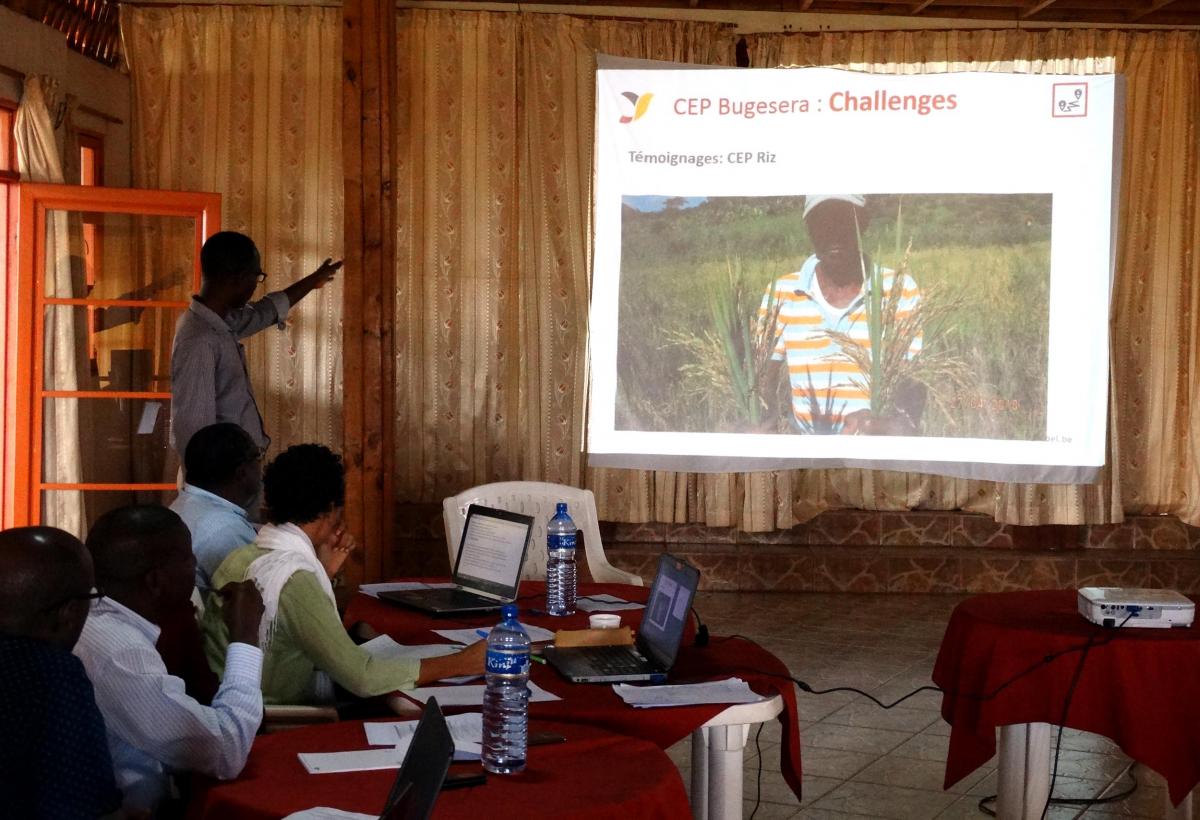
Bilan de l’approche Champs Ecoles Paysans
Jean-francois DETRY | 12/07/2018
Depuis 2014, le PAIOSA a introduit l’approche « Champ Ecole Paysan » (CEP) dans ses provinces d’intervention au Burundi. L’approche « CEP » est une approche d’éducation non-formelle des adultes, utilisée comme méthode de vulgarisation agricole participative. A ce jour, plus de 28.000 producteurs ont ainsi été accompagnés dans plus de 1.000 groupements CEP sur les filières maïs, riz et banane. Du 25 au 27 juin 2018, le PAIOSA a réuni ses partenaires pour apprécier les résultats obtenus, pour identifier les contraintes ou difficultés rencontrées et partager les leçons apprises par filière et antenne, et pour produire des recommandations visant à améliorer / faciliter l’implantation de cette approche, ainsi que l’adoption de bonnes pratiques culturales et d’innovations permettant d’intensifier la production. Une note de capitalisation est en préparation, à l’intention de Enabel siège et projets / programmes / Ministères de l’Agriculture appelés à recourir à l’approche CEP dans le futur.
-
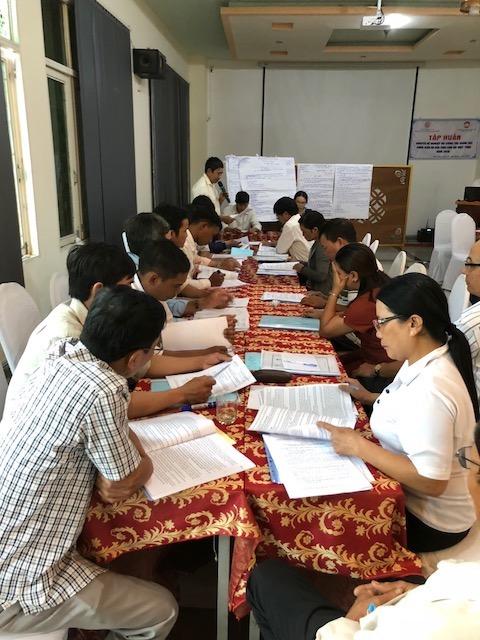
People master the hurdles of criticizing and influencing the local governments‘ policies
Marion FISCHER | 09/07/2018
On July 5thand 6thof 2018, 45 women and men from grassroots-level units of the Vietnam Fatherland Front (VFF) joined a training workshop on supervision and social criticism, which are assigned tasks of the VFF and its member organizations. Mass organizations in Vietnam are entitled to be heard at all levels of local government, who in turn have to respond in kind to criticism and proposals. In the workshop, the VFF activists practically trained how to make their supervision plans, complete with the most relevant topics for monitoring the government decisions and actions at their administrative level.In the second part of the workshop, the participants worked to compose a qualified response to a real half-year report and half-year action plan of socio-economic development, submitted by the district government. In one of the evaluated district reports, the VFF activists found many flaws and “half truths” and demonstrated that the local government had no vision and coherent understanding of the local socio-economic development plan, while the training participants acted in a very knowledgeable and professional way. The workshop demonstrated how a constructive two-way communication between citizens and government can effectively improve the responsiveness and accountability of local governance.
-

Agricultural training translates into multiple profits for rural farmer
Sylvia NABANOBA | 06/07/2018
“Before I joined the Complementary Farmers’ Group and received training from CEFORD, I only produced food for subsistence purposes using traditional methods of digging. My harvest was low; just enough to feed my family without any surplus for sale,” says 42-year-old Ronnie Ajobe, a farmer in Tulenge village, Rhino Camp refugee settlement, where he stays with his two wives and eight children. Ajobe’s story today is a far cry from what he was going through in the past. Having joined a farmers’ group, he received training in improved farming skills as well as farm inputs and, as they say, the rest is history. Ajobe is one of the many farmers supported by Community Empowerment for Rural Development (CEFORD), a non-governmental organisation based in West Nile implementing the Support Programme for Refugees and Host Communities in Northern Uganda (SPRS-NU), which is funded by the European Union Emergency Trust Fund (EUTF). Through its livelihood programme, CEFORD works with groups comprising refugees and Ugandans (host communities), facilitating them to achieve home-based food security as well as income to enable them meet their other needs and save. “Ultimately, we hope to achieve the SPRS-NU objective of improving the communities’ livelihoods through better food and nutrition security in the settlement and host community as well as a stronger business environment and improved commercial flow between the communities,” says Godwin Amege, CEFORD Project Coordinator. Ajobe belongs to Complementary Farmers’ Group, made up of 25 members, 17 of whom are refugees from South Sudan (12 females, 5 males) and eight Ugandans (3 females, 5 males). CEFORD ensured that the group received training in group dynamics to enable peaceful co-existence, strengthen their leadership and resource mobilisation skills and team work. The group was taken through the Participatory Agro Enterprise Development (PAED) training, under which they learnt how to develop business plans and select enterprises. They realised that cassava production was a profitable business in the refugee settlement and therefore selected it as their investment venture. The program supported selected farmers to participate in the production of cassava cuttings for seed multiplication and Ajobe was one of them. “I received six bags of cassava stalk (NASE 19) as part of the start-up input, which I planted on three acres of land at a cost of UGX400,000. I had to cut the stalk into smaller sizes in order to fill the three acres. Weeding cost me UGX2,400,000, making a total cost of UGX2,800,000,” says Ajobe. After just nine months, Ajobe and his family are reaping twofold – the cassava tubers provide food while the stalks can be sold for re-planting. Ajobe currently sells cassava stalks to farmers in new groups; having harvested 150 bags of stalks, he sells each at UGX40,000, earning UGX6,000,000. Ajobe expects to earn an additional UGX6,000,000 from the unharvested stalks as well as UGX7,200,000 from selling the cassava tubers. Cassava tubers are a common food in West Nile, and can be boiled or dried and ground to make cassava flour. He will earn a total UGX19,200,000, making a profit of UGX16,400,000! “I am grateful to CEFORD and the European Union for this project, which has opened our eyes to achieve what we want through farming – not only food but income as well,” Ajobe says. Ajobe also participated in business training, which empowered him with knowledge about marketing: he now knows how, where, when and to whom to sell his produce. From his earnings, Ajobe has already bought a piece of land in the nearby trading centre. “Our plan as a family is to construct a permanent house in Kubala. We will also expand our cassava plantation,” he says.
-
How Congolese refugees can bring economic opportunity to Uganda
Hanna DEKERK | 05/07/2018
On the occasion of World Refugee Day, Enabel’s Support to Skilling Uganda project together with the Embassy of Belgium and the European Union Delegation to Uganda, organised a seminar on "Early Development Preparedness and Response to the Expected DRC Refugee Influx in Uganda". The idea for the seminar stems from a recent scoping study by the International Refugee Rights Initiative on the Congolese refugee influx to Uganda, which assessed the current displacement dynamics in the Democratic Republic of Congo (DRC). The study confirmed a high probability of continued violent conflicts, resulting in a large-scale exodus of Congolese refugees in the following months and years. These vulnerable people will search for protection, access to basic services and livelihood opportunities in neighboring countries such as Uganda. Therefore, the seminar explored ways to ensure that DRC refugees can be woven into the Ugandan socio-economic fabric, hereby focussing on a close collaboration between humanitarian and development partners. The seminar consisted of two panels, with the first one focusing on stability and security issues of the expected influx, and the second one on the economic integration of these Congolese refugees. According to Niels De Block, International Skills Development Expert at Enabel, ”Refugees don’t have to be a burden. They can bring economic benefits to Ugandan society provided that their economic integration is encouraged. By being economically active and entrepreneurial, refugees often push economic growth which then stimulates job creation for the host community.” Eminent researchers, such as Dr. Naohiko Omata (Refugee Studies Center of the University of Oxford), and Dr. Nassim Majidi (Sciences Po’s Center for International Studies), fueled the discussions with keynotes. At the closing round table Belgian ambassador to Uganda, Hugo Verbist, concluded that “In addition to formal education, we should focus on training the youth in refugee and host communities. They need to be skilled, on the work floor or elsewhere, in trades that will facilitate their entrance in the labor market.”
-
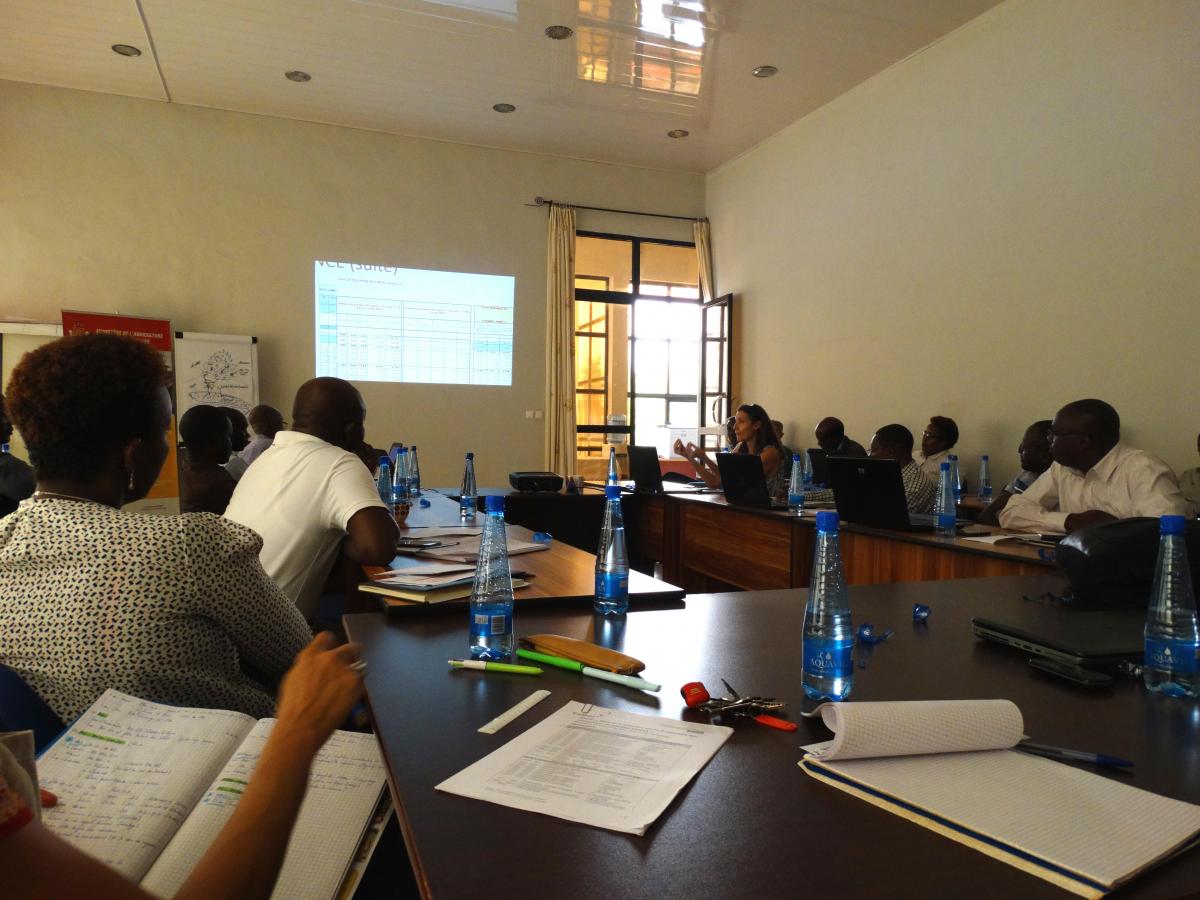
Bilan de la première année d’exécution des conventions de subsides PAIOSA
Jean-francois DETRY | 05/07/2018
Entre septembre 2016 et avril 2017, le PAIOSA a signé 10 conventions de subsides avec différents partenaires actifs dans le secteur agricole au Burundi. A l’issue d’une première année d’exécution de ces conventions, le PAIOSA a réuni ses partenaires au cours d’un atelier de 2 jours pour dresser conjointement un bilan de l’état d’avancement des activités et échanger sur les difficultés rencontrées et les solutions arrêtées, aussi bien sur le plan technique que sur le plan administratif et financier. L’atelier visait 1) à partager les réalisations entre tous les acteurs pour améliorer la synergie et la mise en cohérence des différentes actions contribuant à l’atteinte des objectifs globaux du programme PAIOSA, 2) à préciser les modalités de consolidation / clôture des interventions pour garantir au mieux la pérennisation des acquis après les conventions PAIOSA et 3) à produire des recommandations visant à améliorer / faciliter l’outil « conventions de subsides ».
-

Grassroot mediators: how Vietnam promotes mediation through music, drama and knowledge contests
Erwin DICKENS | 05/07/2018
knowledge contestvisit us at www.facebook.com/hatinh.ralg.1
